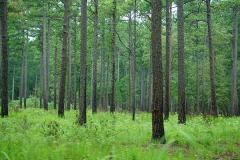Action Plan Provides Recommendations for Natural and Working Lands to Help Meet NC's Climate Goals

The North Carolina Department of Environmental Quality (DEQ) today submitted the North Carolina Natural and Working Lands (NWL) Action Plan to Governor Roy Cooper as part of the state's Climate Risk Assessment and Resilience Plan. The action plan features recommendations to manage the state's natural and working lands—forests, wetlands, agricultural lands, and coastal habitats—to enhance ecosystem and community resiliency and sequester carbon.
Covering 88 percent of North Carolina, natural and working lands provide numerous social and environmental benefits and contribute to more than a fifth of the gross state product. The NWL Action Plan is intended for use by public and private landowners and managers; impact partners, such as universities, nonprofit organizations, corporations, land-use consultants, and investors; and federal, state, and local planners and policymakers to facilitate meeting the goals identified under the plan.
The action plan was developed by a stakeholder group comprised of experts from academia, environmental and community NGOs, and state government agencies, led by DEQ. Duke University's Nicholas Institute for Environmental Policy Solutions led a subcommittee on floodplains and wetlands and coordinated development of a recommendation for coordinated buyouts and restoration in frequently flooded areas.
The Institute also conducted spatial analysis to identify the geographic scope of many of the NWL group’s recommendations, the potential scale of the recommended actions’ carbon and resilience benefits, and how the recommended actions overlap with areas important for co-benefits, such as improved water quality and recreational access. A series of story maps summarize these data and provide examples of how they can be used at the local level.
In the video below, Lydia Olander and Katie Warnell, both of the Nicholas Institute' Ecosystem Services Program, discuss the importance of natural and working lands to the state and preview the story maps.
As directed by Executive Order 80, the larger Climate Risk Assessment and Resilience Plan is North Carolina’s most comprehensive effort to date, based on science and stakeholder input, to address the state’s vulnerability to climate change. The plan is a framework to guide state action, engage policy makers and stakeholders, and facilitate collaboration across the state and focus the state’s attention on climate resilience actions and address underlying stressors, such as the changing climate, aging infrastructure, socioeconomic disparities, and competing development priorities.
In addition to the recommendations for natural and working lands, this plan provides:
- the state's best understanding of the projected change in the climate;
- climate justice impacts;
- state infrastructure, assets, programs and services within 11 critical sectors that are vulnerable and at risk to climate and non-climate stressors; and
- actions currently underway
Read more about North Carolina Natural and Working Lands
See the "Natural and Working Lands in North Carolina" Story Maps




